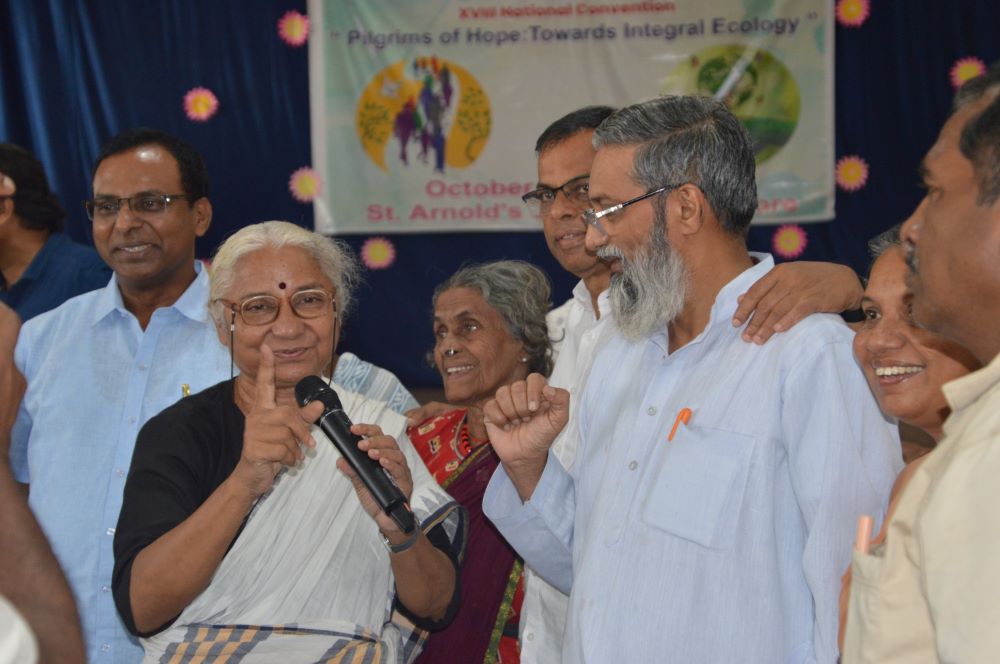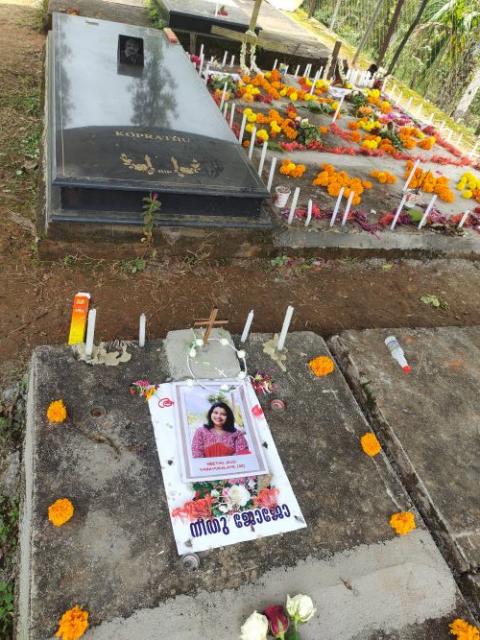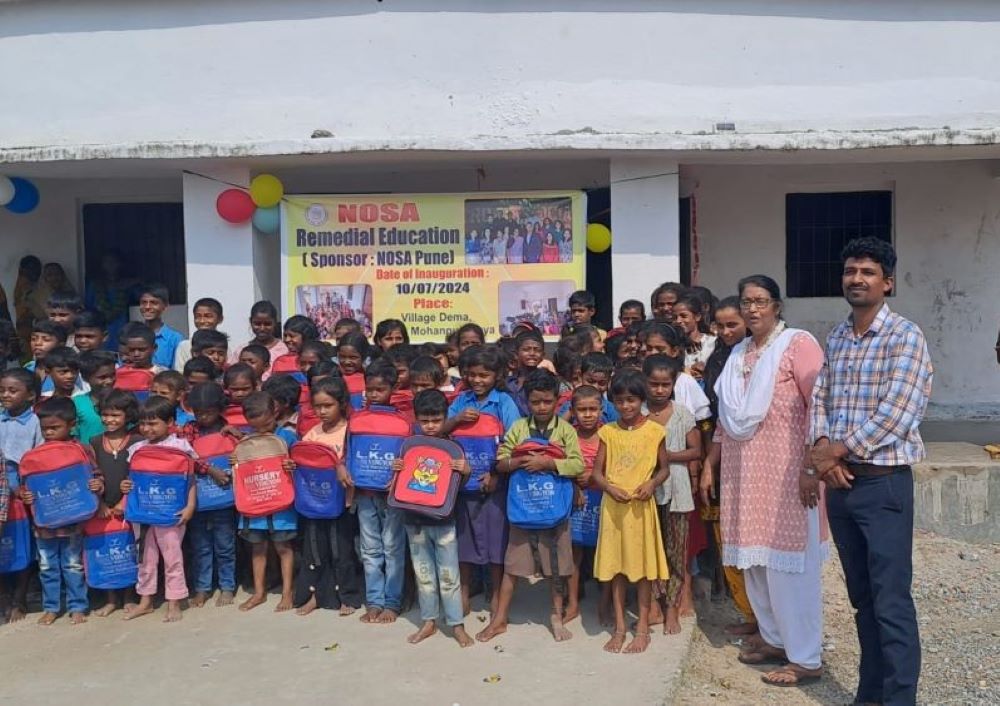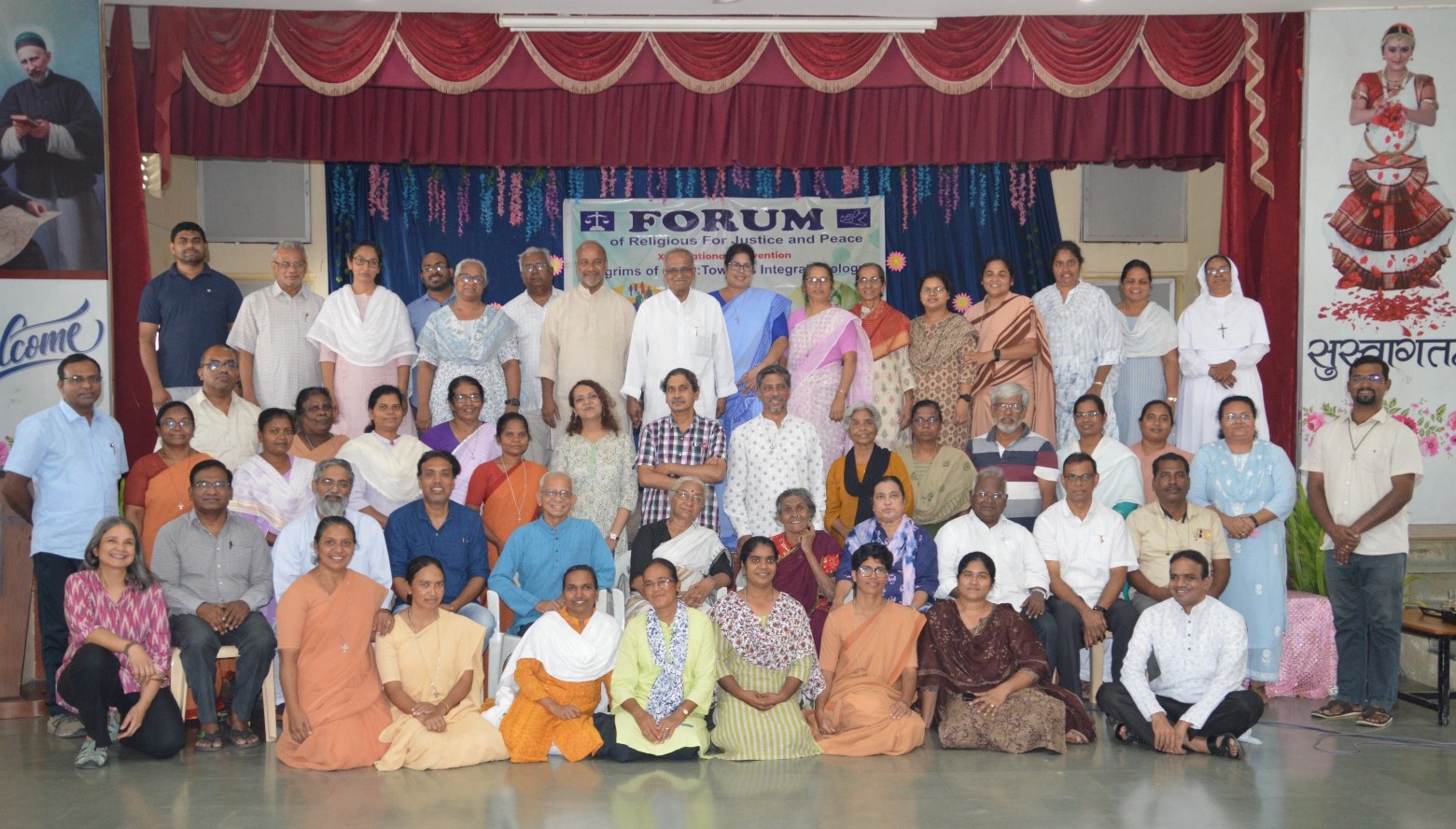
Indian Missionary Society Fr. Anand Mathew (center with beard) stands with his newly elected national team of the Forum of Religious for Justice and Peace. The forum's 18th national assembly, held Oct. 18-20 at the central Indian city of Indore, addressed the theme "Pilgrims of Hope: Towards Integral Ecology." (Courtesy of Dorothy Fernandes)
A national body of Catholic religious working for justice and peace in India has vowed to protect mother earth from "merciless invasions" that create ecological imbalances and climate change.
"Our mother earth is being thrashed with unjustified and illegal encroachments from corporate industrialists, governments and policy makers," said Presentation Sr. Dorothy Fernandes, the former national convener of the Forum of Religious for Justice and Peace.
The forum's 18th national assembly, held Oct. 18-20 at the central Indian city of Indore, addressed the theme "Pilgrims of Hope: Towards Integral Ecology."
Most participants were nuns from 24 congregations, working in 15 Indian states.

A mass graveyard holds some Catholics who were killed in the July landslides in Wayanad, Kerala, India. The tragedy was seen as the aftereffect of manmade ecological imbalances. (Thomas Scaria)
They developed a regional plan to address structural policies that disrupt ecological imbalances. The plan will be tailored to suit the situation in each region.
The group also resolved to increase collaboration with individuals and groups to protect the earth and to oppose eviction of people to make way for development projects.
The participants asserted that development must be people-centered, inclusive, holistic, just, equitable, sustainable and life-promoting.
Founded in 1987, the group of religious women and men works for justice and peace within the church and in society.
"This is not only about fighting climate change, but also to address marginalized people and farmers who are displaced or victimized by the so-called developmental projects," Fernandes told Global Sisters Report on Nov. 4.
'Our mother earth is being thrashed with unjustified and illegal encroachments from corporate industrialists, governments and policy makers.'
—Sr. Dorothy Fernandes
She said Catholic religious have to address multiple layers of injustice while addressing ecology.
The forum assembly, she added, discussed their theme in the light of "Laudato Si'," Pope Francis' 2015 encyclical on the environment, which criticized consumerism and irresponsible economic development, environmental degradation and global warming.
"Today, climate change is a reality affecting millions of farmers and common people, but government policies favor corporate sectors who continue to exploit the mother earth in the name of development," Fernandes said.
Fr. Anand Mathew, a member of the Indian Missionary Society who succeeded Fernandes as the national convener at the assembly, said the forum will devise a variety of programs to focus on ecology and eco-spirituality in the coming year.
"As a first step, we will adopt simple lifestyles, live closer to the poor, and avoid unnecessary consumption and extravagance to save our common home," he said, quoting the assembly's final statement.
He said the participants have started implementing their regional plans to address waste management, renewable energy, watershed management, deforestation, land grabs and greenhouse emissions.
Sisters of Charity of Nazareth Sr. Roselyn Karakkattu, a forum member who works among Musahar, a Dalit community in the eastern Indian state of Bihar, said changes in ecology and climate affect mostly the marginalized people, "whose rights are always ignored."
"Although we have taken up waste management as our main action plan in Bihar, we cannot ignore those municipality workers who clean our public places," said the nun, who manages a community center that educates Musahar children.
For Karakkattu, working for ecology is also a mission for restoring human rights of the most marginalized.
St. Joseph's of Cluny Sr. Jessin Jose, who manages a school for the physically challenged children at Bellari in Karnataka state, southern India, said integral ecology is a spiritual experience of living with respect to humanity and nature. "Both are inseparable and complementary to each other," she told GSR.
Jose said Bellari has witnessed land grabbing in the name of mining, highway expansion and other industrial projects and the worst affected are the poor.
"Even the church in Bellari has suffered huge losses as its prime land was acquired by the government for road expansion," she added.

Sisters of Charity of Nazareth Sr. Roselyne Karakkattu, a member of the Forum of Religious for Justice and Peace, stands with children of the Musahar Dalit community in Bihar, eastern India. The children have been displaced because of developmental projects. (Courtesy of Roselyn Karakkattu)
Among those losing land were the Good Shepherd nuns who have managed a school for almost a century, Jose said. "They have lost a major portion of their campus," she said.
According to Jose, most natural calamities are caused by unscientific developmental projects that lead to landslides in many places.
Landslides in the Wayanad district of the neighboring state of Kerala on July 30 killed more than 400 people and washed away some villages and hundreds of hectares of agricultural land.
"Such disasters happen in many parts of India and no preventive measures are taken to avoid them," Jose said. She was among a group of nuns who have pledged to protest government policies and corporate firms that cause ecological imbalances.
Deforestation was identified as a serious trend in tribal-dominated northeastern Indian states where government and corporate bodies encroach forest areas for development projects, Mathew said.
"Such a trend is also happening in other tribal areas like Jharkhand [eastern India]," said the priest, who manages Sauhard (friendship), an interreligious peace center in Varanasi, northern India.
The forum also criticized India's slow progress in achieving the goals set by the 2015 United Nations Climate Change Conference in Paris, a legally binding international treaty to combat climate change.
"The new religion of unfettered economic growth, wealth creation and consumption harms the environment and threatens humanity's existence," said the forum assembly's final statement.

The annual assembly of the Forum of Religious for Justice and Peace was held Oct. 18-20 at the central Indian city of Indore. Most participants were nuns from 24 congregations, working in 15 Indian states. (Courtesy of Dorothy Fernandes)
According to a World Bank-sponsored study in 2013, India faces acute effects of climate change: increase in extreme heat, changing rainfall patterns, droughts, decrease in groundwater, glacier melt, sea level rise and shortage of agriculture, food products and energy security.
Fernandes said the situation has not changed in the past decade, "but instead, more harm is done to the ecology with several times bigger projects and unscientific land grabbing."
Mathew said the forum members have formed nine subgroups to address the ecological concerns in their region.
Those in the northern Indian state of Uttar Pradesh have taken up waste management as their priority for the year.
The group plans to use social media to spread awareness on waste management among youth, religious congregations, NGOs, parish groups, schools and colleges.
Watershed management is the priority of the Tamil Nadu region in southern India, a region where many villages face drought. Forum members will collaborate with people's groups and farmers to promote water bodies.
The northeastern region has identified land grabbing and deforestation as major concerns. They have developed plans to oppose corporate bodies through village committees and vigilance groups.
In Kerala, southwestern India, pollution of water bodies, rivers and coastal areas worries the forum members. They have developed plans to clean up such areas with the help of people's groups.
The Andhra and Telangana region has decided to network with like-minded groups to oppose the displacement of the poor in the name of developing the banks of the Musi River that flows through the two southern Indian states.
Members from Maharashtra, Goa and Gujarat states in western India have taken up advocacy and lobbying to minimize damage to ecology.
The Delhi region will educate people on the increasing pollution from, in part, stubble burning in neighboring states.
Advertisement




